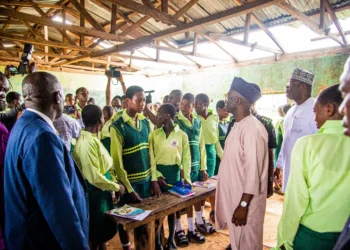The Federal Government is set to distribute N25,000 monthly across 15 million households nationwide as part of measures to minimise the level of economic hardship faced by Nigerians.
Since coming to office last year, President Bola Tinubu ended fuel subsidies and currency controls, leading to a tripling of petrol prices and a spike in living costs as the naira slid against the dollar.
The policies of the current administration has subjected many Nigerians to suffer an economic crisis with soaring inflation, leaving many people struggling to afford food. Many citizens have taken to the streets to register their displeasure with Tinubu’s style of leadership.
Speaking during an exclusive interview on Channels Television, the Minister of Finance and Coordinating Minister of the Economy, Wale Edun, said the Federal Government is working to alleviate the hardship, especially for the poor and vulnerable.

“But I think the important thing to point out, at this time, is that the focus of Mr President is on keeping his promise, particularly to the poor and the vulnerable. Food prices are elevated, and the purchasing power is limited and that is what Mr President is speaking directly to through the intervention programme of direct payments of N75,000 each over three months,” Edun said.
“That is N25,000 a month to 15 million households and each household is about five people. So, that effectively provides funding for 75 million people.”
The minister also re-echoed the Federal Government’s plan to provide grains to help cushion the rising cost of food items.
“More recently, there was a 42,000 metric tonnes release from the strategic reserves with another 60,000 metric tonnes to come. This is all in a bid to make sure there is food in the marketplace,” the minister said.
According to the minister, the current administration is also planning to give artisans, traders, women, and youth, a grant of N50,000 to start nano businesses to improve productivity.
“In this particular case there will be digital verification, just like with the direct payments, direct transfer procedure and in this particular case, it will cover at least 1000 people in all 774 local governments,” he said.
“So that programme will now be another N50 billion. The important thing is to know that to the extent that this is the most direct way to help people at this time, it can be expanded it can be continued until we find a more stable environment in terms of food production, food prices, and affordability through increased spending power of the poor people.”
He stated that the reason for the economic situation at the moment is as a result of eight years of a buildup of money supply, liquidity in the system, and money which was not matched with increased production.
To Edun, the microeconomic put in place would go a long way to provide relief, as technology would be deployed to ensure payments and revenues paid would go directly to desired places without any intermediary.









